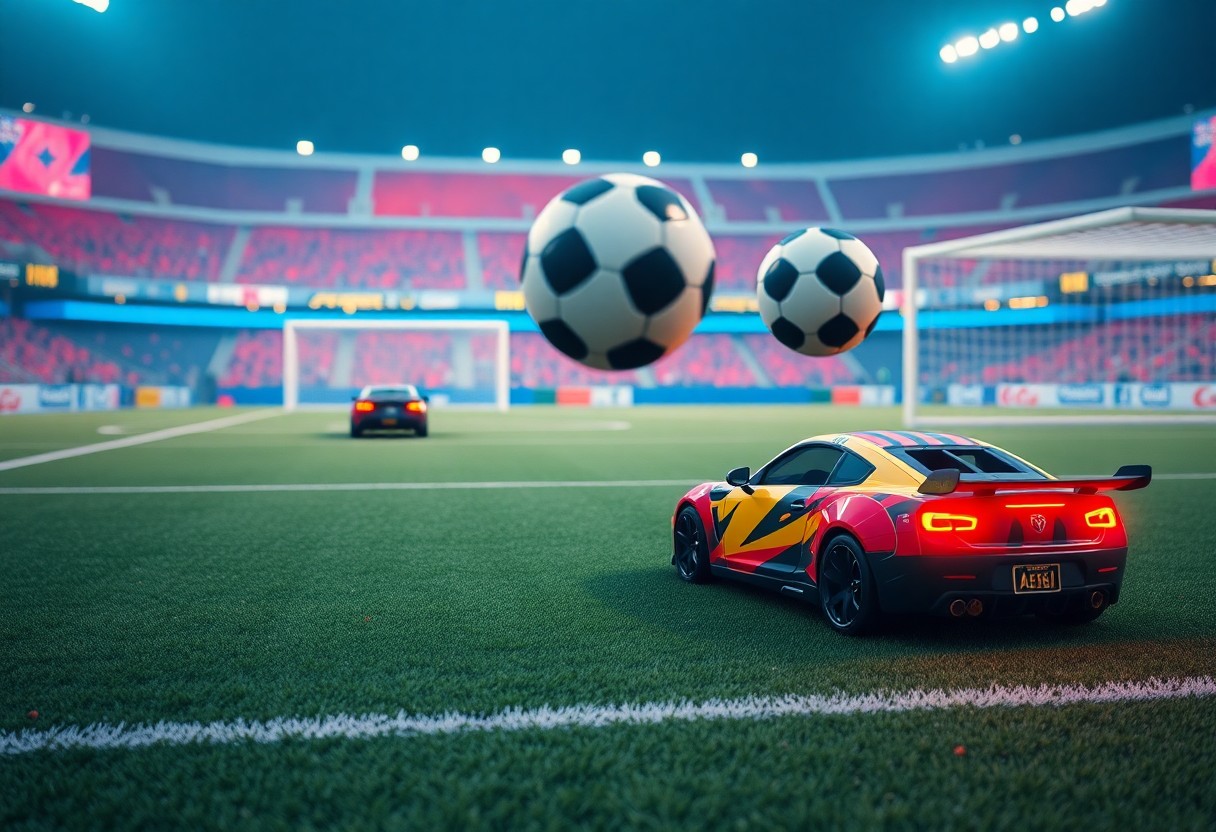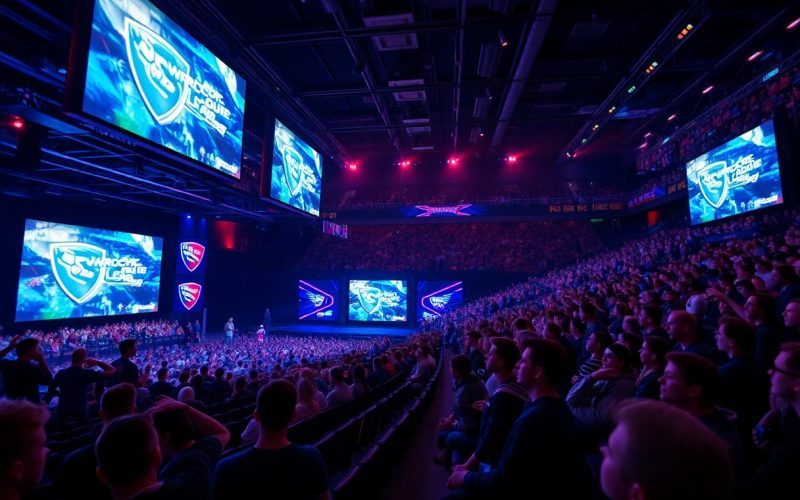Rocket League continues to soar in the esports arena, captivating fans with its unique blend of soccer and vehicular mayhem. As the competitive scene evolves, we examine upcoming tournaments, potential changes in league structures, and the implications for both veteran players and newcomers. Join us as we probe into the future of Rocket League’s professional circuit, highlighting the developments that promise to keep the excitement alive and engage gaming communities worldwide.
The Evolution of Rocket League’s Competitive Landscape
The competitive scene of Rocket League has undergone significant transformations since its launch, evolving from a niche hobby to an international phenomenon featuring organized tournaments and professional players. Initially, community tournaments paved the way for a grassroots movement, but with the establishment of the Rocket League Championship Series (RLCS) in 2016, the landscape shifted dramatically, creating a structured environment for aspiring pros and elevating the game’s profile on a global stage.
Key Milestones in the Pro Circuit’s History
Key milestones such as the advent of the RLCS, which offered substantial prize pools and brought professional organizations into the fold, have marked pivotal moments in the evolution of Rocket League’s pro circuit. The introduction of regional leagues and events like DreamHack and the Season World Championship further enhanced competitive integrity and attracted large audiences. As the game progressed, the introduction of cross-platform play and increased accessibility helped expand the player base and amplified the excitement surrounding tournaments.
Shifts in Community Engagement and Player Participation
Community engagement has dramatically changed, with platforms like Twitch and YouTube enabling players to showcase their talents while interacting with fans. Streamed competitions attracted millions of viewers, effectively bridging the gap between professional players and casual gamers. The growth of social media gave rise to grassroots organizations and amateur teams, allowing new talent to emerge and thrive beyond traditional barriers, ultimately adding depth and diversity to the competitive landscape.
This shift has created a dynamic ecosystem where players from various backgrounds can contribute to the scene. Online platforms provide space for aspiring players to network, share content, and gain recognition—vitally democratizing the competitive landscape. For instance, popular streamers and content creators like SquishyMuffinz and GarrettG have leveraged their platforms to not only build their brands but also foster community-driven events, which engage fans and encourage participation in the pro circuit. This synergy between players, fans, and sponsors has played a significant role in solidifying Rocket League’s status as a mainstream esport, paving the way for further innovation and growth.
The Role of Sponsorship and Investment in Growth
Sponsorship and investment play a pivotal role in the expansion of Rocket League’s pro circuit. With brands recognizing the lucrative potential of the esports scene, these partnerships provide vital financial backing that helps teams thrive and compete at higher levels. Additionally, sponsorship deals lead to enhanced marketing opportunities for brands while promoting player and team visibility within the gaming community.
The Rise of Brand Sponsorships in Esports
Brand sponsorships have surged within esports, with major companies like Ford and Vodafone investing heavily in teams and events. This influx of capital not only enhances the quality of tournaments but also elevates the overall profile of Rocket League, attracting more fans and viewers. These alliances create innovative promotional campaigns that resonate with a younger audience, ultimately bridging the gap between traditional sports and competitive gaming.
Impact of Prize Pools on Player Development
Prize pools significantly influence player development in Rocket League, shaping the competitive landscape. With higher payouts, tournaments attract top talent, motivating players to hone their skills. Financial incentives can impact player dedication, leading to increased practice and strategic refinement.
As prize pools continue to grow, they elevate not just individual players but entire teams. Notable tournaments like the Rocket League Championship Series (RLCS) regularly feature prize pools exceeding $1 million, driving players to excel and invest more time in practice. This professional environment fosters a culture of competitiveness, prompting emerging talents to strive for excellence. The promise of substantial earnings encourages players to adopt a professional mindset early on, ensuring the future of Rocket League remains vibrant and dynamic.
The Future of Online and Offline Tournaments
The landscape of competitive Rocket League is set to evolve further as hybrid events gain popularity, offering a seamless blend of online and offline experiences. This format allows fans from around the globe to engage in real-time, while local audiences can enjoy the electrifying atmosphere of live matches. These events cater to diverse player bases and expand accessibility, ensuring a richer, more inclusive competitive ecosystem that could redefine how tournaments are structured moving forward.
Hybrid Events: Balancing Virtual and In-person Experiences
Hybrid events provide a unique approach to tournaments, combining elements of both online and offline interactions. Fans can participate remotely, enjoying broadcasts and gameplay from the comfort of their homes, while local spectators gain access to an immersive experience, including live commentary and meet-and-greets with pros. This format not only maintains broad appeal but also increases the potential viewer count significantly, presenting opportunities for brands to target both digital and physical audiences.
Trends in Tournament Formats: What to Expect Next
Anticipate innovative tournament formats that harness technology to enhance viewer engagement and player motivation. For example, we’ll likely see leagues incorporating round-robin group stages, giving teams more opportunities to prove their mettle and keeping audiences intrigued. Single-elimination brackets may evolve to offer “loser’s brackets,” ensuring that talented teams don’t exit early, thus sustaining excitement throughout the event. Additionally, engaging mini-tournaments or side-events featuring celebrity matches could draw larger crowds and further promote community involvement.
As tournament formats continue to innovate, hybridization will become a benchmark for success in the esports domain. Expect more leagues to adopt flexible structures, allowing for dynamic matchups across various skill levels. The introduction of community-driven events may also rise, enabling grassroots participation that fosters local talent. Integrating emerging technologies, such as augmented reality features and real-time analytics, into tournament broadcasts will further enhance the viewer experience, paving the way for a new standard in how esports competitions captivate audiences worldwide.
Regulatory Changes and Governance in Esports
As Rocket League’s professional scene matures, regulatory changes are becoming increasingly vital for providing structure and legitimacy. The demand for standardized governance is driven by the need to ensure fair competition, player welfare, and secure investments. With various leagues and tournaments vying for legitimacy, establishing a cohesive regulatory framework could unify the esports landscape, influencing everything from player contracts to prize distributions.
The Introduction of Official Licenses and Regulations
Official licenses and regulations are emerging as fundamental components of Rocket League’s pro circuit, aiming to provide a clear set of guidelines for teams and players. The introduction of licensing standards ensures that all participants adhere to rules governing player behavior, team operations, and financial management. This move helps create a more professional environment, fostering trust and accountability among all stakeholders.
The Implications for Players and Teams
The new regulatory landscape presents both opportunities and challenges for players and teams. Greater oversight can lead to improved conditions, such as fairer contracts and better support systems. However, these regulations also mean stricter compliance requirements and potentially more bureaucracy, which may restrict the operational freedom that many teams have enjoyed. Proactive adaptation to these changes will be key for the longevity and success of organizations in the evolving ecosystem.
Moreover, teams may face increased obligations regarding player conduct, with potential repercussions for violations. This shift requires organizations to invest in educational resources to help their players navigate the responsibilities aligned with these new licenses. Additionally, teams could benefit from enhanced legitimacy, attracting more sponsors and partnerships by showcasing a commitment to professional standards. Staying ahead of these regulatory changes will ultimately determine how well players and teams can adapt and thrive in Rocket League’s competitive arena.
Technological Advancements Shaping the Game
Technological advancements are redefining Rocket League’s professional landscape, enhancing gameplay and fan experiences alike. Innovations in graphics and physics engines contribute to an immersive gaming environment, while improvements in matchmaking algorithms ensure players of similar skill levels can face one another, fostering competitive balance. The introduction of high-energy broadcasts and integration of augmented reality elements during live events indicates a future where viewer engagement reaches new heights, creating both thrilling experiences and valuable sponsorship opportunities.
How Streaming Technology is Enhancing Engagement
Streaming technology has revolutionized how fans interact with esports, offering unparalleled access to live gameplay. Platforms like Twitch and YouTube Gaming now dominate the scene, allowing viewers to watch matches in real-time, participate in chat, and even support their favorite players through donations. Enhanced viewing features such as multi-camera angles and interactive overlays provide a more dynamic experience, while built-in community tools help create a sense of belonging among fans. The immediacy of streaming continues to bolster Rocket League’s popularity and its connection with audiences.
The Potential of AI and Machine Learning in Player Training
AI and machine learning are poised to transform player training in Rocket League, offering tailored insights and feedback for individual growth. By analyzing in-game performance data, AI can identify specific weaknesses and suggest drills to target skill improvement. This personalized approach not only accelerates learning but also equips players with advanced strategies that might take years to discover organically. For example, AI-driven simulators can recreate scenarios to fine-tune decision-making under pressure, allowing players to practice reactions in a controlled, repeatable environment.
Summing up
Now that Rocket League’s professional circuit has gained momentum, the future looks promising as developers continue to enhance gameplay and community engagement. With evolving formats, increased prize pools, and a focus on international expansion, the circuit is set to attract new talent and audiences alike. As teams prepare for upcoming seasons, the emphasis will likely remain on fostering competitive integrity while exploring innovative partnerships to elevate the eSports experience. The journey ahead will undoubtedly shape the landscape of Rocket League as it evolves into a premier gaming title on the global stage.







